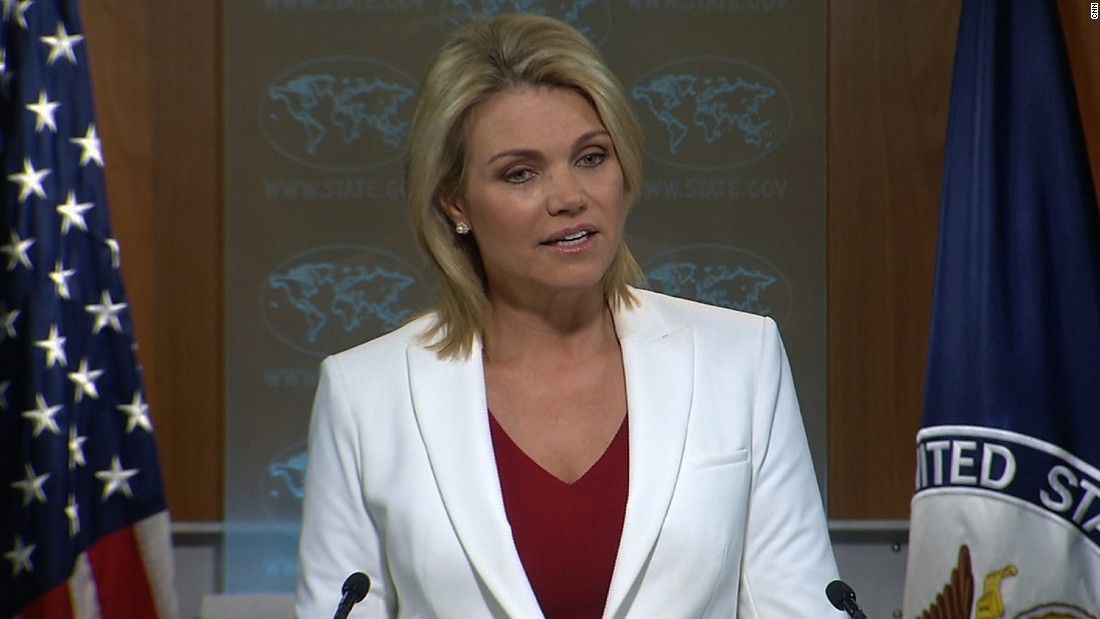Trump appointee Heather Nauert invokes D-Day while praising US-Germany relations
State department spokeswoman ridiculed for saying Allied invasion in WWII showed strength of relationship with government of Germany

A free daily email with the biggest news stories of the day – and the best features from TheWeek.com
You are now subscribed
Your newsletter sign-up was successful
A State Department spokeswoman has been ridiculed for citing the D-Day invasion as an example of America’s “very strong relationship” with Germany.
“We have a very strong relationship with the government of Germany,” Heather Nauert said.
“Looking back in the history books, today is the 71st anniversary of the speech that announced the Marshall Plan. Tomorrow is the anniversary of the D-Day invasion. We obviously have a very long history with the government of Germany, and we have a strong relationship with the government of Germany.”
The Week
Escape your echo chamber. Get the facts behind the news, plus analysis from multiple perspectives.

Sign up for The Week's Free Newsletters
From our morning news briefing to a weekly Good News Newsletter, get the best of The Week delivered directly to your inbox.
From our morning news briefing to a weekly Good News Newsletter, get the best of The Week delivered directly to your inbox.
Nauert’s comments were mocked online with many pointing out the spokeswoman had been hired directly from Fox News.
Saying “we have a very long history with Germany” because the United States fought against Hitler and the Nazi Party in World War II “sounds closer to a veiled insult, and certainly isn’t a positive reflection of the closeness of Germany-US relations”, says Vox.
The State Department spokeswoman’s gaff came while she defending remarks made by the new US ambassador to Germany, Richard Grenell, which drew condemnation from across Germany’s political spectrum.
Grenell, a former US spokesman at the United Nations and a strong supporter of Donald Trump, told the far-right Breitbart News he “absolutely wants to empower” European conservatives who are “experiencing an awakening from the silent majority”.
A free daily email with the biggest news stories of the day – and the best features from TheWeek.com
Grenell “turned heads when he did an interview with Breitbart”, says CNN. The ambassador was criticised for “politicising diplomacy at a time when US-German relations are strained over Trump's withdrawals from the Iran deal and the Paris climate accord and his imposition of steel and aluminum tariffs on the European Union”, adds the broadcaster.
Grenell’s words were “widely received as Grenell weighing in on German politics — against Chancellor Angela Merkel’s centrist government, and in favor of the right-wing Alternative for Deutschland party”, says Vox.
Grenell later denied that this is what he meant, “but the damage was done”, adds the website.
-
 The environmental cost of GLP-1s
The environmental cost of GLP-1sThe explainer Producing the drugs is a dirty process
-
 Greenland’s capital becomes ground zero for the country’s diplomatic straits
Greenland’s capital becomes ground zero for the country’s diplomatic straitsIN THE SPOTLIGHT A flurry of new consular activity in Nuuk shows how important Greenland has become to Europeans’ anxiety about American imperialism
-
 ‘This is something that happens all too often’
‘This is something that happens all too often’Instant Opinion Opinion, comment and editorials of the day
-
 Greenland’s capital becomes ground zero for the country’s diplomatic straits
Greenland’s capital becomes ground zero for the country’s diplomatic straitsIN THE SPOTLIGHT A flurry of new consular activity in Nuuk shows how important Greenland has become to Europeans’ anxiety about American imperialism
-
 Epstein files topple law CEO, roil UK government
Epstein files topple law CEO, roil UK governmentSpeed Read Peter Mandelson, Britain’s former ambassador to the US, is caught up in the scandal
-
 Iran and US prepare to meet after skirmishes
Iran and US prepare to meet after skirmishesSpeed Read The incident comes amid heightened tensions in the Middle East
-
 Which way will Trump go on Iran?
Which way will Trump go on Iran?Today’s Big Question Diplomatic talks set to be held in Turkey on Friday, but failure to reach an agreement could have ‘terrible’ global ramifications
-
 Israel retrieves final hostage’s body from Gaza
Israel retrieves final hostage’s body from GazaSpeed Read The 24-year-old police officer was killed during the initial Hamas attack
-
 China’s Xi targets top general in growing purge
China’s Xi targets top general in growing purgeSpeed Read Zhang Youxia is being investigated over ‘grave violations’ of the law
-
 Ukraine, US and Russia: do rare trilateral talks mean peace is possible?
Ukraine, US and Russia: do rare trilateral talks mean peace is possible?Rush to meet signals potential agreement but scepticism of Russian motives remain
-
 Panama and Canada are negotiating over a crucial copper mine
Panama and Canada are negotiating over a crucial copper mineIn the Spotlight Panama is set to make a final decision on the mine this summer